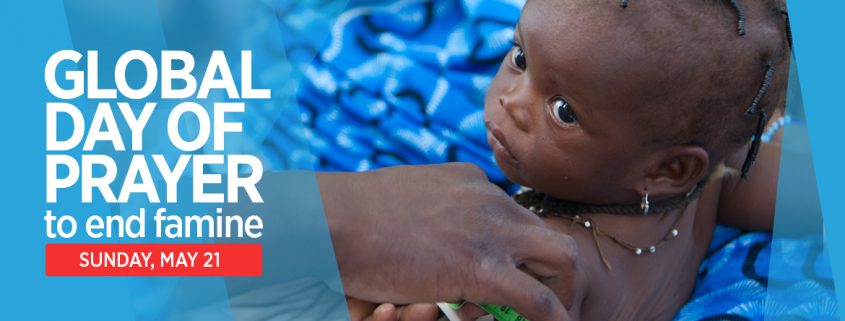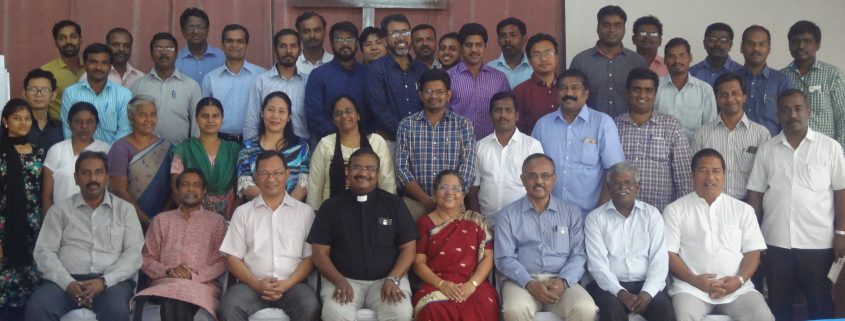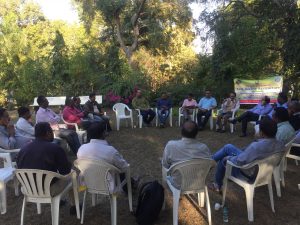An Indian Missiologist describes the discussion on ‘Cyber Mission’ as Historical
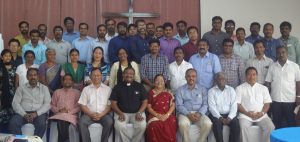
A Training on Cyber Mission was organized on March 23, 2017, by the National Council of Churches in India-Unity and Mission, and NCCI – Youth Concerns, along with the World Association of Christian Communication (WACC), India Missions Association (IMA), Christian Service Agency (CSA) and Tamilnad Christian Council (TNCC). This training was hosted by the Friends Missionary Prayer Band (FMPB) at its Head Quarters in Chennai.
Fifty Mission Workers from twenty Mission Movements and Organizations from various parts of India enthusiastically participated in this training. The aim of the training was to focus on the role of mission(s) in the cyber era by using ‘cyber space’ and ‘social media’ for effective mission work. Technical and practical inputs were given on the relevant and appropriate use of media apps such as ‘Facebook’, ‘WhatsApp’, ‘Blogs’, ‘Twitter’, ‘You Tube’ and the like to the Mission Workers. To emphasize the importance of the subject, the sessions were given cyber-language titles such as ” Login ” for the Inauguration, and ” Cyber Mission Explorer” for the Keynote Address.
Dr. Esther Kathiroli, Secretary, Tamilnad Christian Council served as the Chair and Moderator for this training. This training was inaugurated by Rev. R. Christopher Rajkumar, Executive Secretary, NCCI – Unity and Mission. In his inaugural address he introduced the concept and explained the importance of Cyber Mission by scanning the cyber context of our times with significant statistics and explanations, orally and visually. Rev. Dr. Wati Longkumer, General Secretary of the India Missions Association shared greetings of peace and advocated the need for a paradigm shift in our traditional mission work. Further, he said, this meeting is ‘historical’ as this is the first time the Indian Mission Movements are discussing about Cyber Mission. He thanked the NCCI – Unity and Mission for introducing and facilitating the discussions. Rev. Dr. Sudarshan, General Secretary of the Friends Missionary Prayer Band welcomed the trainees as a host and emphasized the importance of finding ways to use ‘Cyber Space’ for gospel work.
The session on ‘The Cyber Mission Explorer’ was facilitated by Rev. Dr. Peter Singh, Professor – Christian Communication at Tamilnadu Theological Seminary, Madurai. Dr. Singh presented a paper titled as “Social Media: An emerging new Location for Christian Mission to the Digital Natives”. Dr. Peter Singh defined “cyber natives” or “digital natives”as people who use cyber space for their day to day lives through gadgets and digital technology . He implied that practicing Christian mission in this context of several social networking possibilities where people are not merely consumers but also active creators of information, can be very challenging. Therefore, we need to look at the recipients of the Gospel appropriately, because they are not mere consumers of (y)our good old gospel(s). He further emphasized that the Great Commission (Matt 28: 16 -20) has to be seen as an opportunity for the churches and the mission movements to explore all possible and available ways to communicate the gospel, and if we do not appropriate them with the needed strategies and methodologies, we will remain behind while the world goes ahead with speed of growth and development of next generations. This session was moderated by Mrs. Faith Kulothungan a grass-root mission leader from Maharashtra.
The following session was titled as “Surfing on ‘Digital Mission”’. This session aimed to ‘import’ information on ‘History of World Mission’ and its development and how the present generation mission could appropriate time and space. Rev. Christopher Rajkumar presented the history of world mission movements chronologically with adopted shifts in the mission approaches, paradigm shifts with needed categorization on the theme ‘Mission Update’.
Mr. Jianthaolung Gonmei, Executive Secretary of NCCI – Youth Concerns presented the context of the ‘Next-Generation Christianity’, and how and why missions need to address the societies and communities of the present cyber generation. He elaborated on the context of the cyber generation youth and the children who are part of the digital world and their challenges and opportunities, and therefore the importance of adopting relevant mission(s) that involve them too.
Mr. Vinod Shemron, who does internship with the NCCI – Unity and Mission, facilitated a session on ‘Skype-ing Mission: Face (time) mission’. He referred to the role of social media in mission and how and what could be done in terms of appropriating the space and time that we see today. He also elucidated the use of Whatsapp, Facebook, YouTube, twitter, etc. This three part session gave answers to the three pertinent questions in the minds of the gathered people : what is mission? who are we addressing? what are the media that we can employ? This session was moderated by the Rev. Dr. Regi Samuel of Inter-Service Church Association (ICSA), who uses these digital schemes for his ministry.
The adjutant session was on ‘Desk-top’. This session was aiming to offer a practical tour to experience the use of handsets (smart phones, tabs and computers). Three experts facilitated them to open up accounts in WhatsApp, Facebook and BlogSpot and encouraged them to use these for their mission works. Rev. Arvind Jeyakumar a Research Scholar and Theological Educator from the Methodist Church in India elucidated how’Facebook’ could be effectively used for our mission work. This session was titled as ‘Interaction’. Further he explained about responsible posting of views related to faith and inter-faith relationships that ought to be looked at from a peace perspective, and using the Facebook responsibly to convey the ‘great commandment’ that the Lord taught us. Mr. Jianthaolung then dealt with ‘Smart-Phones’. He practically demonstrated how to use Whatsapp to equip the missionaries to create groups and the process of broadcasting messages to the recipients. He informed about the technicalities of the application and the securities that need to be taken in the process of sending messages to their group members. Mr. Vinod facilitated the session titled as ‘Browser’. He facilitated the participants to practically create a ‘blog’ account and to publish a blog. He informed about the importance and use of blogs, their reach, and their outcome. This session which helped the missionaries to gain confidence in using such apps for their mission work, was moderated by Rev. Kannan Rajendran of India Missions Association.
These input and practical sessions were followed by group work titled as “Group Chat (cntl+s)”. The participants were divided into 5 groups with five different questions:
- Why cyber mission?
- Why should mission use technology?
- How cautiously could mission use technology?
- What are the challenges in adapting technology in mission?
- What do you want to tell the mission world?
Each group identified a reporter to present a report of their discussion. The presenters of the five groups identified and brought forward many innovative suggestions and a road map. Every group realized that there is a swift process in digital globalization which could hinder mission activities. A confession was also made that these discussions ignite them to review and re-think their present mission approach and initiate a study with an open mind to look for appropriate use of cyber space and gadgets. They also affirmed that there is virtual space through which God’s people can be reached for missional purposes.
The closing act was titled as “Logout”. Rev. Zohmingthanga, Programme Executive of IMA, facilitated a feedback session in a creative way. Every participant found the discussions meaningful, challenging and timely. Some said that though they had lagged behind in getting into cyber mission, still it is better late than never from them to get started today. Some expressed their desire of forming cyber groups for mission work and the youngsters would be encouraged to be freelance missionaries.
Rev. Christopher Rajkumar reminded the gathering about the importance laid in Luke 15 (Lost Sheep, Lost Coin, and Lost Son). The Shepherd could have used some “Technique” to re-trace the lost, the Lady could have used a “Technology” of lighting a lamp to trace the lost coin, but ultimately the gospel affirms the “Transformation” in the lost son. So, let us use appropriately and adequately, either a technique or technology for transformation which is the ultimate result of all our mission. Secondly, he suggested to have a shift from preaching the gospel to ‘do’ the gospel, referring to the movement from the great commission to the great commandment.
In his concluding remarks, Rev. Dr. Wati Longkumer referred to the insights gained on digital natives and the digital immigrants that have become new concepts for modern missiology. He appreciated the Mission Leaders for having identified the Cyber Mission as an important area to be adopted for our missional interventions.
Rev. Daniel David of the FMPB proposed the vote of thanks and concluded by referring to the 500 years of the Reformation and its historical importance. He observed that these discussion challengingly bring “reformation thoughts” among the mission movements. The training concluded with a word of prayer by Rev. Prabhakhar, FMPB, and the Benediction pronounced by Rev. D B Kulothungan, Treasurer, IMA.
| Rev. R. Christopher Rajkumar
Executive Secretary
NCCI – Unity and Mission |
|
Mr. Jianthaolung Gonmei
Executive Secretary
NCCI – Youth Concerns
|

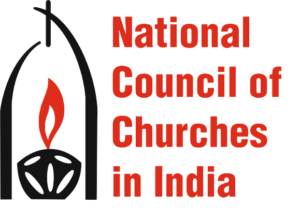
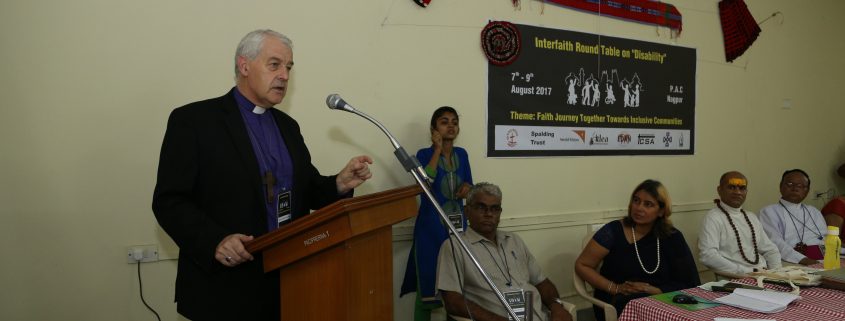
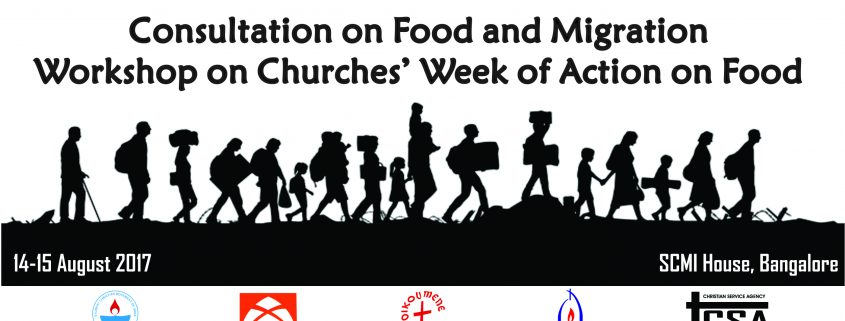

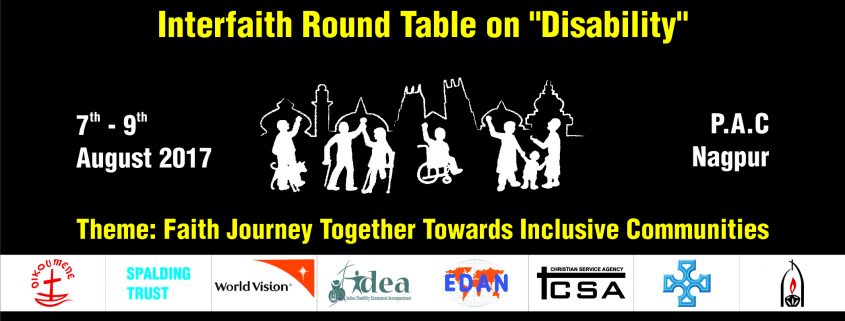

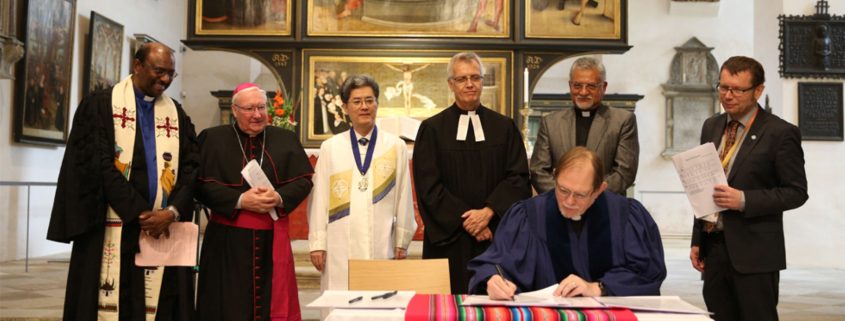

 “The Reformation taught us accountability,” said Kassab in her sermon.
“The Reformation taught us accountability,” said Kassab in her sermon.
